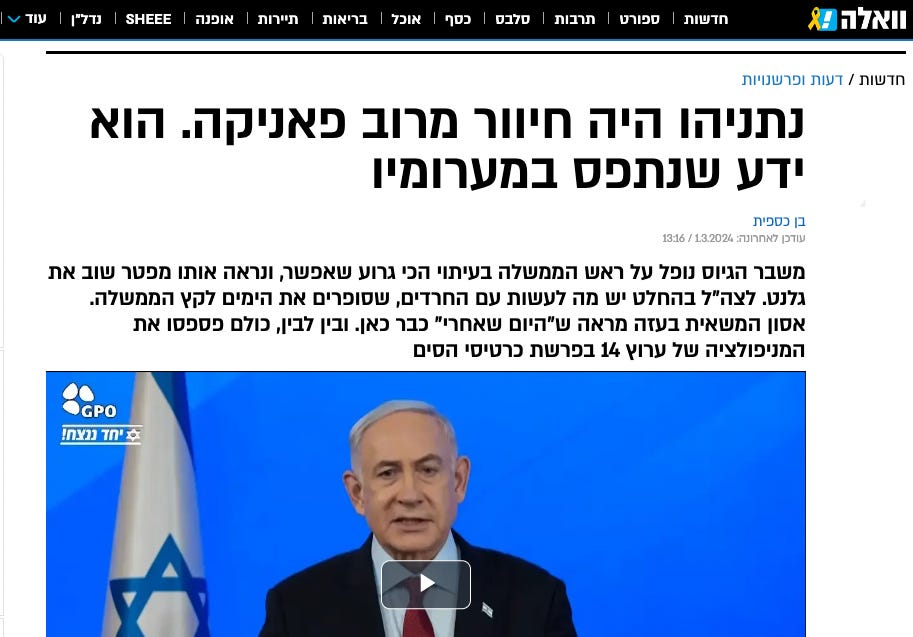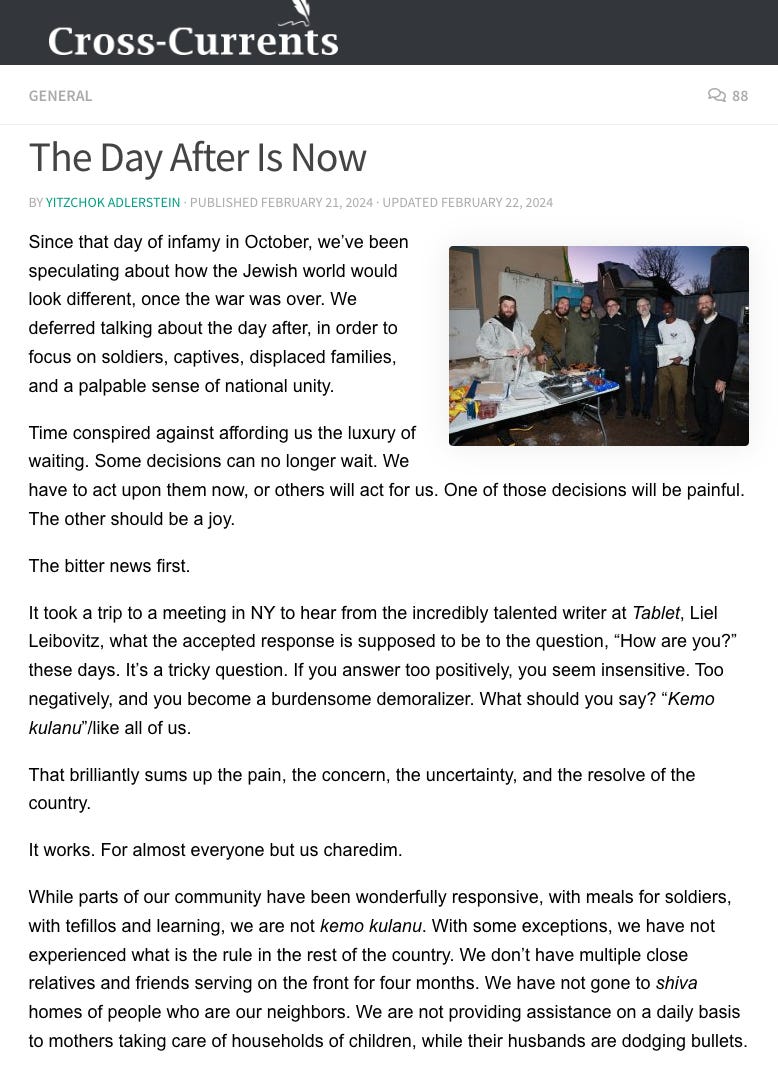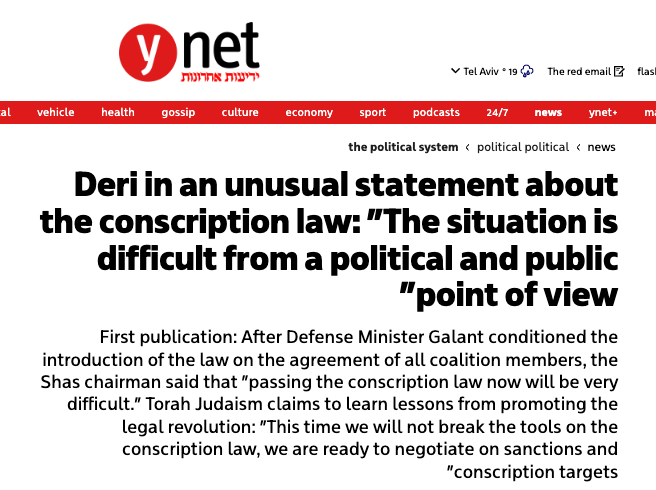Almost since the war began, as Benjamin Netanyahu’s polling numbers dropped and exasperation with the present government increased, one question has hovered: “Obviously,” the question went, “if elections were held today, Bibi would lose. But he has a coalition of 64 members, which gives him some cushion. How is anyone going to bring about those elections?”
Netanyahu, of course, will do everything he can to forestall elections, and he’s said so. When asked about the possibility of elections, he responded, “The elections have a date, it’s in a few years. I suggest we don’t concern ourselves with that during the war.”
But if there was an informal ban on politics after October 7, that socially self-imposed taboo is now eroding. There are anti-government protests in the streets, and more ominously for Netanyahu, an issue that might actually bring down his government—the Haredi draft.
During the period of social unrest about judicial reform, each of the “pro” groups had its own agenda. Bibi had his, Levin and Rothman had theirs, settlers had theirs—and the Haredim had an agenda, too. They wanted the Supreme Court weakened so it could not overturn a law that this coalition has promised them it would pass—permanently exempting their sons from military service.
That proposed law seems to have died. The Supreme Court was not defanged since most of the judicial reform didn’t go through (because of the war). With Israel desperate for more military manpower, the notion that 13% of the country will continue to refuse to serve seems outrageous and immoral; Gantz and Gallant have refused to push forward legislation that the army needs to keep more manpower mobilized unless the Haredi men are now included.
It’s all more complicated than this, but those are the basics. If Bibi sides with the army, the Haredim will leave the coalition and (as they did earlier this week) riot in the streets. His government will end. And if he sides with the Haredim, Israelis will take to the streets out of sheer rage and exasperation. This could blow.
Today, we offer a few different views of how various people and groups are thinking about this. More on that below.
First, a photo I took on the sidewalk a few days ago, and at the bottom, what it made me think of.
Then, our schedule for the week, and then
Today’s post.
I was walking on Hebron Road in Jerusalem, midway between my home and my office, when I saw the following. “Wolt” is our Door Dash. These two guys are Wolt motorcycle food delivery-guys. What you see is them in the midst of prayer, their Moslem prayer rugs in front of them. People saw them, walked by quietly, and went on their way.
I took the picture because something else struck me. More on that below.
WEDNESDAY (03/06): Shmuel Rosner, a very thoughtful commentator on Israeli politics and society, has appeared on our podcast before. He’s lately expressed his exasperation with the budget being allocated to the Haredim and the entire Haredi situation at large. So our podcast with him, with an excerpt for everyone and the full conversation with a transcript for paid subscribers, will explore Tuesday’s topic in greater depth.
THURSDAY (03/07): Freddie DeBoer is not Jewish, and not a nationalist. In fact, he’s quite opposed to nationalisms of all sorts. Which obviously means he’s no great fan of Israel. In a recent essay, he urged us to fold up tent and move the Jews to America, where they flourish quite nicely. I obviously don’t agree with him, but there’s nothing more interesting than reading something that presses all your buttons but is so smart that you can’t ignore it. I’ll respond a bit to DeBoer’s essay, and we’ll share an audio of my response to a question someone asked me recently, given what’s happened here, would I still make Aliyah? I explained why, in a heartbeat, I’d “do it all over again.”
FRIDAY (03/08): Last week, on the day of the disaster in Gaza that followed the swarming of an aid convoy, I noticed a profound difference between the coverage abroad and the coverage in Israel. This past weekend’s press, in stories that had nothing to do with that, explained much of the difference.
Now, for the Haredi issue. We’re presenting a variety of views here, to afford our readers and listeners a sense of the tone here (and abroad, in this instance).
Netanyahu fully understands the danger of the moment, and is hopeful that a compromise can be worked out. But a compromise that does not draft a significant number of Haredim will not satisfy most of the country.
We begin with the video above, to which we have added subtitles. It’s former Prime Minister Yair Lapid explaining to Israeli society why this is “the moment of truth” for Israeli society.
We then continue below with:
a portion of a seething column by leading Israeli journalist Ben Caspit
a comment by Rabbi Yitzchok Adlerstein of Los Angeles, who describes himself as Haredi and has something very interesting to say, and finally
An admission by the head of the Shas Haredi party that the bill they had hoped for is probably dead.
We begin, below, with Ben Caspit.
Ben Caspit is a leading, much respected Israeli journalist, both in print and on TV. He is center to center-right in his views, with the one exception that he has completely lost patience with Netanyahu. So what you have below, a small portion of his column that appeared last Friday in Walla (an Israeli Hebrew news site), is not the rant of a leftist, but the exasperation of a person somewhat on the right. It’s a Google translate, in which we’ve fixed the most problematic mistranslations.
Here’s the text of the portions we’re quoting:
Netanyahu was white with panic. He knew he’d been caught in his own trickery
Yoav Galant's statement on the conscription law is an earthquake. The shockwaves and its aftershocks will only get stronger and stronger, until we reach the brick wall that awaits the Netanyahu government. That wall didn't pop up overnight. It has been building, solidifying, and intensifying, throughout the years of the saga since the expiration of the Tal Law [DG — a temporary law that allowed the exemption of Haredi men from the draft, that the Supreme Court may now rule cannot be extended]. The High Court has already made it clear that there will be no further extensions, there will be no time-outs, there will be no more winks. The time has come to decide. Now it's not just the High Court. Now this is also reality itself that awaits the Netanyahu government down the road. Painful reality
When the Minister of Defense says that he will not put on the Knesset table a law that will not be acceptable to all factions of the coalition, this is more than a mere political moment. The ultra-Orthodox are currently in a system frenzy and are calculating their end, or the end of the government backwards. Their mistake is that they don't realize that this time it's real. It's not a spin, it's not a drill, it's not trolling. The IDF really needs combat soldiers. The IDF needs ultra-Orthodox. The debate surrounding this statement began to rage in the skies on October 7.
That black Sabbath was the most costly wake-up call in the history of the Jewish people. It cost 1500 dead, thousands of wounded, hundreds of thousands of refugees, two security belts (within Israel) and enormous economic damage. The meaning of this wake-up call is simple: the current IDF is far too small for Israel's security challenges. The army urgently needs the addition of thousands of fighters each draft cycle. This is a fact. It is already here. The choice is to lower the enlistment age to 16, to import fighters from Thailand or to recruit the sector that isolates itself from the realtties of this world. In the meantime, the IDF is forced to increase the burden on those who are already carrying it: the regular service has been extended, the reserves have been extended (by factor of 4), the exemption age from reserve duty has been sharply raised. In any other country the mobs would already be burning the streets.
We are in a war. We don't have the privilege to burn anything now, except Hamas (and if there are no choices, then Hezbollah too). But this war will end someday. After the war, we will have to do what we have not dared to do since 1948. This time, we will have no choice. There is no power that can stop it. Not even the ultra-orthodox.
This is simple math. in numbers that do not converge. Those who continue to expand setlements in Judea and Samaria and increase the daily friction with the Palestinian population know that the IDF will have to keep at least 25 battalions there at all times (usually even more). On October 7, it was proven that the Gaza force is too small for Gaza. The threat posed in the north is intensifying and it will be necessary to double the forces that hold the line from Rosh Hanikra to Hamat Geder (including the Golan Heights).
The IDF will have to establish 2 more regular divisions and 3 or 4 more reserve divisions. Double the number of tanks. The same goes for new infantry brigades, combat helicopters and all the logistics in between. And these are not plans for the distant future. These should be plans for tomorrow morning The ultra-Orthodox must understand that this time it is not a political event. This time it is an existential event. Up until today, the debate has been carried on comfortably because everyone believed that even if the ultra-Orthodox mobilized, the army would have nothing to do with them. We argued, with a wink. Yes, yes, we said to ourselves, right away. There will be infantry battalions here with the purity of the ultra-Orthodox.
Well, now the army has something to do with the ultra-Orthodox. The ultra-Orthodox recruitment cycle is around 12 thousand young people. Around 4,500 to 5,000 of them do study Torah. Several hundred are actual recruits. Around 7,000-6,000 dodge. In total, from the age of 18 to the age of 26, which is the age of exemption, there are 66 thousand ultra-Orthodox youth. That amounts to 120 battalions. It's a game changer on steroids. Even if only half of them will enlist (and the other half will learn), it's a tremendous tie-breaking event. Even if only some of them end up in combat or support positions, that will be enough. This will allow the IDF to release for combat many recruits who today end up serving in other, non-combat roles.
The ultra-Orthodox must understand that the political fire that is now raging in the coalition is barely a charcoal barbecue compared to the forest fire that is raging in the security field. We reached the watershed. You can't cheat anymore, you can't turn a blind eye. Reality is staring us in the eye and we must not look down. It's over. The age of draft evasion must pass from the world.
The Haredi draft issue is obviously an internal Israeli matter. But it was fascinating to see a leading right-wing, highly-respected American rabbinic figure say something that might not have been said before. Rabbi Yitzchok Adlerstein, whom I had the pleasure of knowing when I lived in Los Angeles, recently published the following on Cross-Currents. The remainder of the column can be read here.
Something is changing. True, the American Haredi community is not the Israeli Haredi community. But the fissures in the solid wall are beginning to appear everywhere.
So much so that even Aryeh Deri, the head of the Haredi Shas party, was quoted as follows on YNet (Google translated screen shot).
“To break the tools” is an Israeli phrase which means “pull out all the stops.” Deri is saying that this time, they won’t do that. This time, he says, it may be time to face the music.
Back to that photo of the two Arab men praying on the sidewalk on Hebron Road. Why did it strike me? Because they were doing their thing, dozens of people were walking by in every direction, and no one bothered anyone.
I thought to myself: “If two obviously Jewish guys stopped on the sidewalk on some major American campus to pray Mincha, what are the chances that they’d be left alone? Pretty low, I imagined.
We’re staying far away from the sad, frightening and maddening outbreak of anti-Semitism in the United States—it’s a different issue. But, it could have significant influence on Israel, so when something major appears on the subject that seems worthwhile, we’ll at least point to it.
This came out in recent days in The Atlantic. I recommend reading it.
https://www.theatlantic.com/magazine/archive/2024/04/us-anti-semitism-jewish-american-safety/677469/
Impossible Takes Longer is available on Amazon and Barnes & Noble and at other booksellers.


























"This is the moment of truth for Israeli society," says Yair Lapid about the Haredi draft. Is Israel about to change a long-immoral policy?